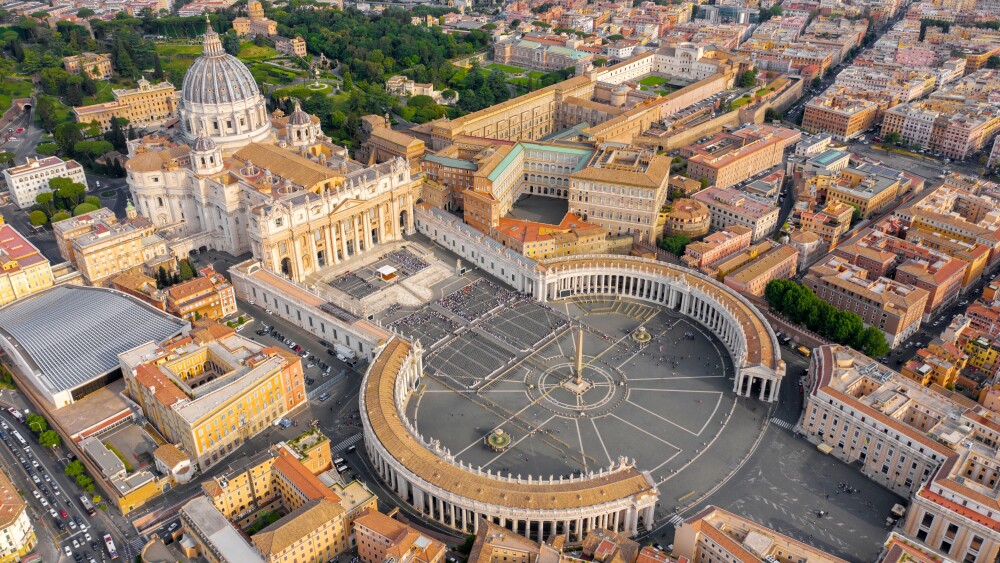The Vatican has signed an agreement with Azerbaijan, dismissing a warning from hundreds of academics who condemned Rome’s “complicity in legitimizing” Baku’s ethnic cleansing and cultural genocide of Armenian Christians.
The Holy See signed the accord on interreligious dialogue with Azerbaijan on July 28, 2025, against the backdrop of growing concern about Azerbaijan’s repression of Christians. “In recent decades, the Holy See and the Republic of Azerbaijan have demonstrated a shared desire to develop and strengthen their relations,” Cardinal George Koovakad, prefect of the Vatican’s Dicastery for Interreligious Dialogue, explained. In April 2011 the two states agreed to promote for Azerbaijan’s Christians “respect for a minority religious community.”
In September 2023, Azerbaijani forces expelled Nagorno-Karabakh’s 120,000 Christians, ending a 1,700-year-old community.
Such statements appear in dissonance with Azerbaijani behavior. In September 2023, Azerbaijani forces expelled Nagorno-Karabakh’s 120,000 Christians, ending a 1,700-year-old community. Azerbaijan has proceeded to destroy Christian graveyards, destroy churches, and sandblast inscriptions from monasteries that are hundreds of years old. For this reason, on July 21, 2025, U.S. lawmakers introduced resolutions in the Senate and House of Representatives condemning Azerbaijan’s “ethnic cleansing and cultural destruction” of the Armenian Church.
Following a trip to Azerbaijan in May 2025, the United States Commission on International Religious Freedom reported that “the religious freedom situation in Azerbaijan remains highly restricted,” with the government subjecting “virtually all religious practices to intrusive state oversight.” The commission urged the U.S. government to impose sanctions on Azerbaijani state agencies and place it on a Special Watch List for violators of religious freedom. Azerbaijan subjects Armenian Christian prisoners to beatings, psychological abuse, lack of access to food and medicine, and attempts to burn off cross tattoos.
Others, such as the Middle East Forum’s Michael Rubin, have warned that Azerbaijani behavior is getting worse, especially as diplomats appease the Aliyev regime. President Ilham Aliyev’s “continued military aggression against Armenia proper, and now his claims to all Armenia as ‘Western Azerbaijan,’ reflect a man who both sees Armenians as illegitimate and a leader that lives in terror of his own people now recognizing his exploitation and mismanagement,” Rubin wrote.
In April 2025, 350 scholars signed a statement condemning the Vatican’s capitulation to Azerbaijani propaganda, after Rome’s Pontifical Gregorian University hosted a conference on “Christianity in Azerbaijan: History and Modernity.” The symposium “advanced state-sponsored narratives aimed at erasing the historical presence of the Armenian Church and appropriating its monuments by falsely attributing them to the ancient Caucasian Albanians,” the academics wrote.
“What makes this episode uniquely alarming is the Vatican’s glaring complicity,” the scholars stated. “The involvement of senior Vatican officials in an act that effectively legitimizes cultural genocide against Armenia—the world’s first Christian nation—is a demonstration of profound moral bankruptcy.” The academics blamed the Vatican’s acquiescence to Azerbaijan on the “increasingly close financial ties” it has cultivated with the oligarchy in recent years.
Many religious freedom and Christian activists accuse the Vatican of appeasing Azerbaijan’s oligarchy in exchange for financial support from the Heydar Aliyev Foundation.
As there appears to be little factual basis for the Vatican’s description of Azerbaijani good faith, many religious freedom and Christian activists accuse the Vatican of appeasing Azerbaijan’s oligarchy in exchange for financial support from the Heydar Aliyev Foundation, headed by Mehriban Aliyeva, the vice president of Azerbaijan and wife of President Ilham Aliyev. Heydar Aliyev, the father of the current president, was a member of Central Committee of Soviet Union and also head of Azerbaijan’s KGB. Emin Rustamov, then-president of the Azerbaijan Italian Youth Association in Rome, revealed in a 2020 tweet that “Azerbaijan has donated more than 1 million euros for the restoration of several historical monuments and churches in the Vatican.”
The Heydar Aliyev Foundation subsequently acknowledged it had donated to several Vatican projects, including the repair of catacombs in St. Peter’s Basilica, the bas-relief depicting the encounter between Pope Leo I and Attila, King of the Huns, and the restoration of the St. Commodilla catacombs. “For over ten years, religious monuments of significant historical importance in the Vatican have been restored with the support of the Foundation,” the Heydar Aliyev website reported. The foundation funded the restoration of artworks in the Pio Clementino Museum and paid for the restoration of cabinets in the Sistine Hall and over 3,000 books in the Apostolic Library. In 2009, it contributed an undisclosed sum to the reconstruction of the pro-cathedral Church of the Virgin Mary’s Immaculate Conception in Baku. Former President Heydar Aliyev gifted the land on which the church was built.
Neither the Dicastery for Interreligious Dialogue nor the Holy See Press Office responded to a request for comment.








